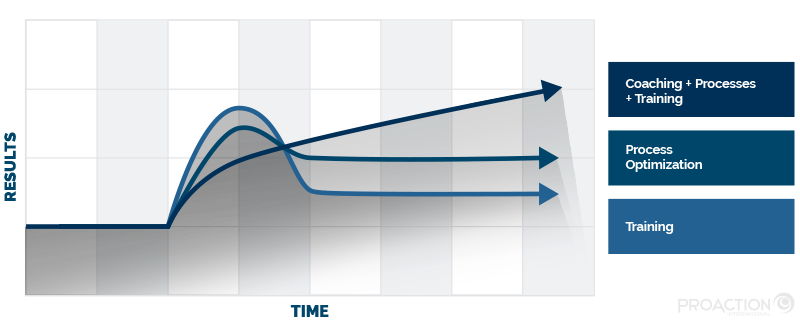
By Phil Gautrin, CEO USA at Proaction International
To perform at their best, organizations in the food industry must adapt to the fluctuations of a changing market while complying with the most stringent standards. The agility they need relies on optimized business processes and a strong management team to rely on daily.
Why managerial coaching is so important
Front-line managers are often excellent operations employees who have risen through the ranks to oversee the activities in their area. They have profound technical knowledge, but little managerial know-how and skill.
In fact, research conducted over the past two decades indicates that 62% of managers (including front-line supervisors) have weak or very weak management skills.
Our data also shows that companies in the food industry that have implemented a strong management coaching culture have seen tangible and sustainable results*:
- 15% improvement in productivity
- 34% cost reduction in product waste
- 10% improvement in indirect labor costs
*Real statistics from Proaction International’s clients in 12 countries over the last 2 decades.
Bottom line: Improving management skills is a low-hanging fruit for food industry businesses that need to improve their performance. It’s a solution that leverages existing workforce talent, instead of requiring the hiring of additional employees or major investments in technology and equipment to increase throughput.
Training vs coaching: Going from good to great
Training is about teaching theoretical and practical knowledge, for example, about the front-line manager’s role and key topics for organizational performance. For training to lead to a sustainable improvement in performance, this knowledge must be transformed into management behaviors, adopted by managers, and maintained over time. Although very effective in developing knowledge, training alone does not however ensure that best practices are sustained.
By supporting managers in their daily work, coaching helps anchor the desired behaviors by transforming them into habits or, better yet, reflexes. When the best management practices are so deeply integrated that they become natural behaviors, the results on the organization’s performance are tenfold, in a sustainable way.
Active supervision coaching in the food industry
By coaching front-line managers to master and apply the principles of active supervision, food production, processing, and distribution organizations are empowered to win not only in terms of yield and material recovery, but also in terms of product quality, employee engagement, health and safety, and environmental sustainability.
Whether they need to adapt to projected and fluctuating volumes, gain efficiency on cleaning and start-up of the production line, or improve material yield and recovery, coaching is a proven way of developing management skills to better drive performance.
People-centric management to thrive in the face of labor shortages
Management coaching not only influences companies’ operational performance – it intervenes at the human level. In other words, it helps create work environments that promote well-being, personal fulfillment, and, more generally, employee engagement.
“I have seen our managers blossom through coaching. They are more present on the floor, more confident, and just rocking it with the DMS. The approach and the system gave them the ability to become strong leaders.” ~Karen Maynard, Human Resources Director, Zavida Coffee
4.5 million Americans left their jobs in the movement known as the Great Resignation in the wake of the COVID-19 pandemic, and the trend continues into 2022. Businesses that do well focus on employee engagement and on their managers’ ability to create and keep it alive. These businesses will see their retention not only less affected but improved in the coming years.
If you already have a management coaching culture in place, you might want to double down on it. If you don’t, now is the time to seek expert help in developing your managers’ leadership and training internal coaches who will keep the coaching culture alive to sustain the benefits of best management practices.
 Phil Gautrin, CEO USA at Proaction International, is an operations management expert who helps organizations achieve their business objectives through sustainable growth. Over the last 25 years, he has empowered businesses to increase their revenues, analyze their performance metrics, and develop new tools, systems, frameworks, platforms, and processes to increase efficiency.
Phil Gautrin, CEO USA at Proaction International, is an operations management expert who helps organizations achieve their business objectives through sustainable growth. Over the last 25 years, he has empowered businesses to increase their revenues, analyze their performance metrics, and develop new tools, systems, frameworks, platforms, and processes to increase efficiency.









